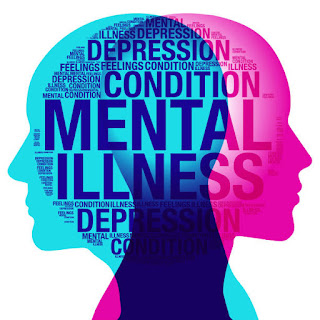Who Becomes Mentally Ill?
- It can affect anyone, regardless of age, ethnic background, income or gender.
- One in five Canadians has or will develop a mental illness.
- Sometimes mental illness is complicated by drug and alcohol use
Depression:
Refers to severe and prolonged feelings of discouragement, frustration and even a sense of despair. Multiple causes such as specific, distressing life events, a biochemical imbalance in the brain or persistent psychological factors such as a negative or pessimistic view of life. Common symptoms of depression:
- Irritability.
- Anxious mood.
- Trouble sleeping or sleeping too much.
- Loss of energy and excessive fatigue.
- Physical aches and pains.
- Diminished ability to think and concentrate.
- Feeling bored and not interested in many aspects of your life.
- Imagining you have an illness such as cancer when there are no physical indications.
- Feelings of worthlessness, hopelessness
- Possibility of suicidal thoughts
- Changes in personal grooming
- Isolation and withdrawal
- Inability to experience joy or pleasure
Bi-Polar Disorder:
Refers to the two poles of the continuum of mood with alternating periods or cycles of mania highs and depression lows as described previously. Common symptoms of mania:
- Persistently high or irritable
- Decreased need for sleep.
- Appetite disturbance.
- Excessive spending.
- Reckless and impulsive behaviour.
- Inflated ideas about what you are capable of doing – grandiose thoughts.
- Delusional and psychotic thinking.
- Hyper sexuality
- Heightened senses to colour, noise, and smell
- Accelerated thoughts and speech.
Psychosis:
The word psychosis is used to describe conditions that affects the mind, in which there has been some loss of contact with reality. When someone experiences the symptoms of psychosis, their condition is referred to as a psychotic episode. It affects an individual’s thoughts, feelings and behaviours. Some people experience psychosis as a part of their mental illness or because of using or withdrawing from drugs and alcohol. It is most likely to occur in young adults. About 3 out of every100 people experience a psychotic episode in their lifetime. It occurs equally in males and females and across all cultures and levels of socio-economic status. Most people make a full recovery from the experience. Common signs and symptoms of psychosis:
- Disorganized or confused thinking.
- Reduced concentration, attention
- Reduced drive and motivation, lack of energy
- Sleep disturbance
- Anxiety
- Social withdrawal
- Behavioural changes, irritability
- Hallucinations or delusions
- Disorganized speech
Anxiety Disorders
- A group of disorders which affect behaviour, thoughts, emotions and physical health. Caused by biological and situational circumstances. Heightened and continuing response to a perceived threat. Types of anxiety disorders:
General Anxiety Disorder
- Repeated and excessive worries lasting at least six months pertaining to routine life events and activities like work, relationships, finances and family.
Panic Attacks
- Fear of imminent death leading to heart palpitations, choking, nausea, faintness, dizziness, chest pain and sweating.
Panic Disorder
- Fear of situations which may cause a panic attack.
Phobias
- Overwhelming feelings of terror in response to a specific object, situation or activity.
Obsessive-Compulsive Disorder (OCD)
- Repetitive actions used to cope with recurring or unwanted thoughts.
Post-traumatic Stress Disorder (PTSD)
- A sense of re-experiencing a traumatic event for months and sometimes years after the incident.
Treatment & Recovery
Treatment for any mental illness, whether or not it is complicated by drug and alcohol misuse, should occur as soon as symptoms appear. Recommended treatment involves a combination of approaches:
- EDUCATION – To help you and your family/support system understand the illness, its causes and effects and ways of dealing with symptoms.
- MEDICATION – New ones are now available with fewer unpleasant side effects than older medications.
- PSYCHOLOGICAL THERAPY OR COUNSELLING - To help you understand what is happening, change your lifestyle to optimize the chances for recovery and learn new skills such as problem solving and relaxation techniques.
- SOCIAL, EMPLOYMENT AND EDUCATION SUPPORT – You may need support to stay at your job, or in school. This is important, so you maintain skill development and continuation of income and do not become cut off from friends and workmates. Research has shown that people who experience mental illness have fewer relapses when their family or other support system is involved in their care and treatment. The same is true when substance misuse is involved. If friends and family are knowledgeable and informed, they are in a better position to support you.





3 comments:
mental illness is removed with the counseling of the patient. It has been implemented for the use of the https://familymedicine.residencypersonalstatements.net/guidelines-on-occupational-therapy-personal-statement-writing for all issues. The mental strength is gained with the help of the pure items for the prisons.
Mental illness is very dangerous disease for the patients. All the issues of the illness and helpful link is assured for the humans. The use of the offer is design for the acute movement of the joy for the patients.
mental illness is hard disease for the patients. All the issues of the illness and visitors of the https://internalmedicine.residencypersonalstatements.net/tips-on-creating-successful-physician-assistant-personal-statement are collecting information. The pattern is fixed for the flow of the theories for the future offers for the humans.
Post a Comment